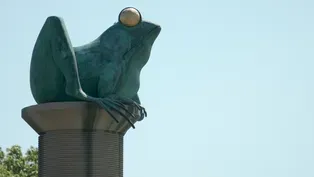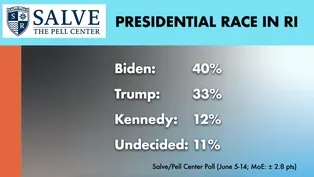
Green Seeker: Losing Lobsters
Clip: Season 5 Episode 26 | 9m 13sVideo has Closed Captions
The lobster population off the Rhode Island coast is dwindling due to climate change.
Oceans are taking the brunt of climate change, which has serious implications for marine life in southern New England. As water temperatures have warmed, the lobster population in Rhode Island has decreased significantly. Lobstermen and a University of Rhode Island researcher explain how lobsters are suffering.
Rhode Island PBS Weekly is a local public television program presented by Rhode Island PBS

Green Seeker: Losing Lobsters
Clip: Season 5 Episode 26 | 9m 13sVideo has Closed Captions
Oceans are taking the brunt of climate change, which has serious implications for marine life in southern New England. As water temperatures have warmed, the lobster population in Rhode Island has decreased significantly. Lobstermen and a University of Rhode Island researcher explain how lobsters are suffering.
How to Watch Rhode Island PBS Weekly
Rhode Island PBS Weekly is available to stream on pbs.org and the free PBS App, available on iPhone, Apple TV, Android TV, Android smartphones, Amazon Fire TV, Amazon Fire Tablet, Roku, Samsung Smart TV, and Vizio.
Providing Support for PBS.org
Learn Moreabout PBS online sponsorship- My grandfather was a lobsterman, so he would always go out and he would be on the boat catching the lobsters during the day and then bring it into the restaurant.
Attached to the restaurant was also a fish market, so he'd sell the lobsters at the fish market and they'd cook them up in the kitchen.
- [Michelle] Lobsters are more than a summer staple for 25-year-old Ebben Howarth.
Fishing for them is a core memory from his childhood on Block Island, 12 miles from the Rhode Island mainland.
These days, it's also his way of life.
(traps clacking) Howarth says he had an epiphany several years ago.
If he didn't get into lobstering, it was only a matter of time before there'd be no more commercial lobstermen on the island.
(water splashing) - I felt this pull to just go out and try it, and see if it was something that spoke to me and something that I enjoyed doing.
And when I went out there, I just, it was really, really special.
It was really, really good quality time with my grandfather.
And I just like being on the water.
I like the work itself, it's exciting, it's rewarding.
- Howarth caught no one in his family by surprise when he decided to become a commercial lobsterman seven years ago.
When you first told your family that you wanted to be a lobsterman, did anyone say, "Ebben, you're crazy, don't do it."
- No, it was gradual too, but I didn't ever receive that.
They were always really, really into it.
(motor rumbling) - [Michelle] It's a career fewer people are choosing.
In 2006, there were more than 300 commercial lobster men in Rhode Island, last year, there were 97.
- It's tough work and there's easier ways to make money nowadays.
And I think that if people are given the option, then they'll probably go for an easier, more safe, more consistent way of life.
- But you didn't?
- No, I didn't.
- [Michelle] He knows these traps won't catch anywhere near the amount of lobsters his grandfather harvested on these same waters.
- When he started fishing in, I wanna say it was probably the '50s and early '60s, he said that they would catch anywhere from five to 10 fold what I would catch, and also on a much faster rate too.
(subdued music) - [Michelle] In 2000, lobstermen in Rhode Island brought almost 7 million pounds of lobster to shore.
Last year, they landed just over 1 million pounds.
Scientists say climate change is depleting Rhode Island's lobster population.
Since 1960, Narragansett Bay has warmed three degrees Fahrenheit.
- Lobsters have a fairly narrow preferred temperature range, from about 54 to 64 degrees Fahrenheit.
- [Michelle] Jeremy Collie has been studying lobsters for decades.
He's a professor at the University of Rhode Island's Graduate School of Oceanography.
He says when lobsters are in warmer waters, they exert more energy and metabolism, which leaves them with less energy to grow and reproduce.
- If the water's colder than 50 degrees or warmer than 68 degrees, they'll try to avoid those temperatures, because their survival would be diminished if they stayed in water that was either that cold or that warm.
- How would you describe the lobster population in Southern New England now compared to, say, five, 10 years ago?
- The population is depleted.
- [Michelle] The lobster industry in Rhode Island has had its share of ebbs and flows.
Professor Jeremy Collie oversees a weekly trawl survey at the University of Rhode Island, which goes back decades.
It shows the population of lobsters in Narraganset Bay peaked in the mid '90s.
These days, Collie says, it's at historically low levels.
- I think, ultimately, with climate change, with increased temperatures, this area may become unsuitable habitat for lobsters.
So we really, in that case, lose.
We're kind of at the southern end of the distribution, and so there's always a risk that we're gonna lose that population altogether.
- [Michelle] It typically takes five to seven years before a lobster is big enough to be harvested.
But Collie says many are dying long before.
Young lobsters look like small insects, which make for great prey.
- The predators are mainly other fish species.
- [Michelle] Jon Grant has been a lobsterman on Block Island for more than 40 years.
He says more fishermen are finding baby lobsters in the stomachs of their predators.
- I see it from other guys who catch the scup or the sea bass, and they'll be fileting, "Hey, look there's a baby lobster here."
And then they always like to tell us that.
And now, there's seals.
I mean, we never used to see a seal here past the end of April or early May, and now they're here all year round.
And what are they eating?
- [Michelle] Grant sells lobsters from his boat on the old harbor dock.
He says the atmosphere has changed as fewer lobsters have been found.
- There's no fights on the dock anymore, which, and it's so much less stress.
You know, this, that part of it is great.
- This is where I store the lobsters in between selling them from the docks or if we use them for our catering events.
- [Michelle] Despite that silver lining, those who are catching lobsters in the Ocean State face plenty of challenges, including decades of pulling up lobsters infected with shell disease.
It's an infection on the animal's outer shell.
- And that's actually a bacteria that infects the shell.
And in extreme cases, it can kind of start to kill them, and make them a little bit more lethargic and create infection beneath the shell.
- [Michelle] Research shows warmer water temperatures have been correlated with higher rates of shell disease.
- And the problem with shell disease is that you get a lower price per pound for lobsters.
For example, if I were to sell this one per pound, it would probably fetch maybe $5 or so, where this one could fetch 10 or $11.
- Oh wow, big difference.
- Yeah.
- [Michelle] The disease leaves lobsters with circular lesions, but Howarth says it does not affect the taste of the lobster meat or cause harm to those who eat it.
- What I've incorporated into my business model is buying the shell disease or picking the shell disease that I catch, sourcing it from other local fishermen, and then selling lobster meat prepackaged by the pound.
It's kind of a workaround that I've come up with to be able to still use all the shell disease that I'm pulling in.
- [Michelle] Howarth typically spends two days a week fishing.
When he's not on the boat, he's running his business, Sediment, a sea-to-table catering business with his fiance, Maddy Murphy.
- So we take the lobster that I was catching, we team up with my mother, who is a produce farmer, steal kale from her garden, herbs from her garden, and just bring a simple lobster bake to your table, pack everything in, pack everything out.
Take the hassle out of what eating lobster is for a lot of people, is the mess.
- Where do you see the future of the lobster industry in Rhode Island heading five years from now?
- I see it the way it's been, as just a few guys doing it.
I don't see it really, I don't really think it can get much smaller than what it is and I don't expect it to get any bigger than what it is right now.
- [Michelle] Both Grant and Howarth collect research on lobsters for the Commercial Fisheries Research Foundation, including how many have shell disease and the severity of it.
They receive a stipend for their work.
Howarth says he hopes the information helps shed light on how marine life is changing around Rhode Island, where he says he's living his dream.
- I love that I get to be on the water.
I love that I get to connect with other people and the local food industry, and it's just a really good feeling, seeing that process through.
It's really, really gratifying.
I hope that in five years I'm still doing that.
Video has Closed Captions
Why a small town celebrates its heritage by honoring frogs. (8m 31s)
Video has Closed Captions
A poll finds the race for president is close among Rhode Island voters. (5m 10s)
Providing Support for PBS.org
Learn Moreabout PBS online sponsorshipRhode Island PBS Weekly is a local public television program presented by Rhode Island PBS













